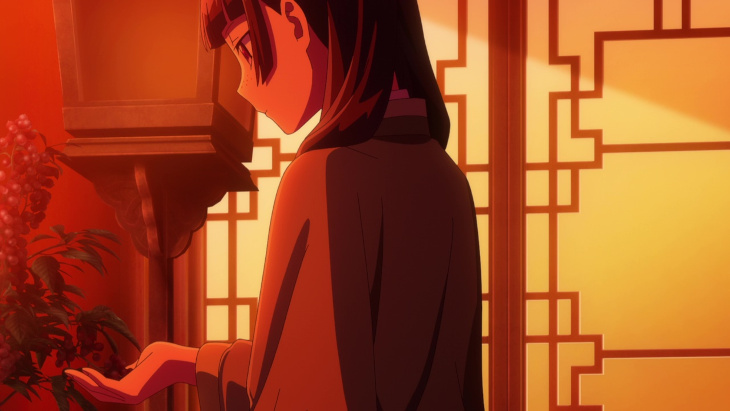
“If you’re ever tasked with executing me, can you make sure it’s with poison?”
The big irony of the Fall 2023 anime season was that I almost missed two of the best shows of that year, albeit for inverted reasons. I almost skipped Frieren because it was one of the first shows that aired, and I thought it might be another generic fantasy series. In contrast, I nearly missed out on The Apothecary Diaries due to it airing so late. The Apothecary Diaries premiered roughly three weeks behind the rest of the shows from fall season, so it’s a testament to its writing and characters that it made such waves in the anime community despite the late start. Frieren may have handily nabbed the Anime of the Year title, but Maomao is a strong contender for Character of the Year.
Ultimately, what makes The Apothecary Diaries work so well is that it emphasizes two key factors, a decent series of mysteries and a strong central pairing. This is a formula that has worked for procedural series for decades. Though, by using an overarching narrative to provide connecting tissue for the various mysteries, the show ensures it can weave a narrative filled with intrigue that isn’t dependent on singular mysteries of uniform length. For anyone who’s a fan of puzzles and suspense, The Apothecary Diaries is a must watch.
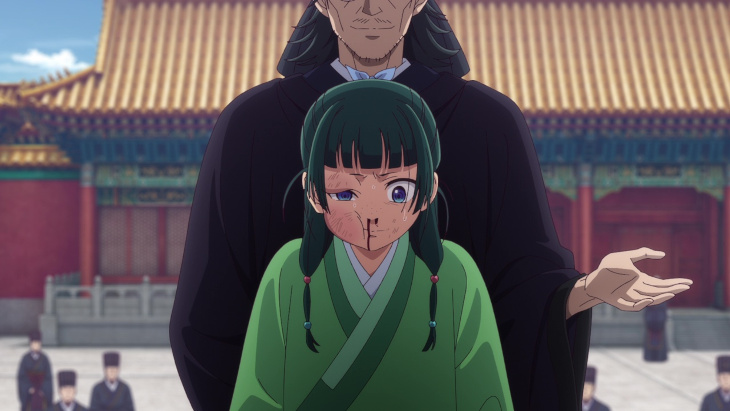
As I alluded to in the opening of this review, the show is anchored by its primary protagonist Maomao, a skilled apothecary who finds herself abducted from her home in the pleasure district and effectively sold off to the Imperial Court as a servant. With her kidnappers receiving regular payment from the Palace for her service, Maomao is bitterly resigned to simply keep her head down until she reaches the end of her term, as any attempts to improve her station by revealing her skill sets would simply lead to additional pay going to the kidnappers. However, when she learns of a medical ailment afflicting two of the Emperor’s infant children, her curiosity and sense of responsibility take precedent.
While I referred to the show as a mystery series, that description falls short in some ways. The implication when encountering a mystery series is that its “cases” will be covered in an episode, an arc, or even the entire show. Mysteries in this series can last several episodes or several minutes, and sometimes feed into one another, so it has a looser flow than is traditional for the genre. Furthermore, given the nature of the story, it’s not uncommon for stories to lack a perpetrator.
The most common comparison I’ve seen is to House, which isn’t entirely apt, but it makes some sense. Both series featured standoffish protagonists who use their analytical skills to decipher the truth behind medical mysteries and social dynamics. However, the characterization of the leads still feels different. Maybe, it’s because both The Apothecary Diaries and Maomao herself lack the sense of pessimistic bitterness that was central to Dr. Gregory House’s identity, but the comparison always felt misleading to me on a tonal level.
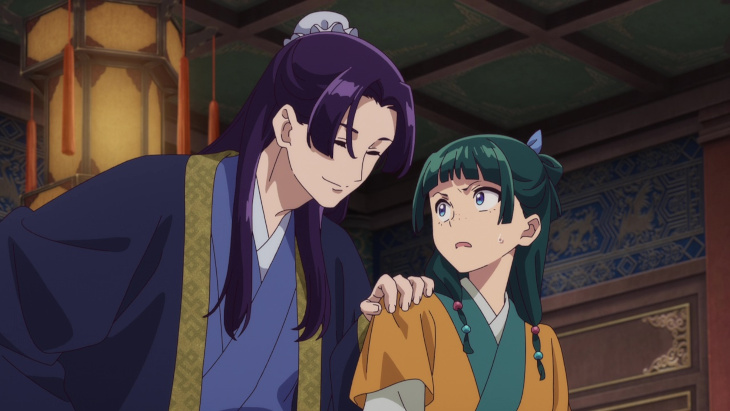
A key factor in why I couldn’t fully agree with that comparison is the rest of the cast and their relationship with Maomao. Our second lead is Jinshi, an apparent eunuch who oversees the administration of the rear palace, and is thus tasked with overseeing the Emperor’s concubines. An intelligent schemer, Jinshi quickly recognizes Maomao’s talents and seeks to capitalize upon them, but he quickly falls for her when he realizes that she, with her aloof calculating approach, is completely immune to his superficial charms. Admittedly, Jinshi’s harassment and occasional teasing of Maomao can toe or even cross some lines, though the show never implies those instances are okay. Plus, the show makes it clear that Jinshi respects Maomao, and much of its cases come from issues that Jinshi brings before her. With one or two exceptions, the remainder of the cast don’t feel as well defined as our leads, but if there is one thing they share, it’s their affection, if occasionally just tolerance, of Maomao.
Maomao is obsessed with poisons, so much so that she experiments on herself with them. While her profession makes good use of this fascination, it’s a little amusing how the rest of the cast have an unspoken understanding that you keep an eye out for and on Maomao, because you never know what she might get into.
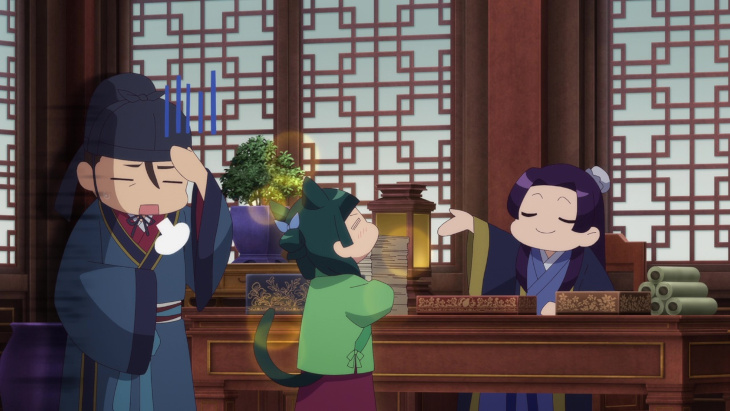
This was a joint production by Toho Animation Studio and OLM. My understanding is that Toho is usually more of a distributor and business partner than a traditional studio, but I could be mistaken. My exposure to OLM’s work is a bit limited. They’ve been working in the anime scene for nearly three decades, but, aside from the original Berserk anime and a handful of other titles, much of their work was targeted firmly at younger audiences, including Pokemon, Inazuma Eleven, and Beyblade.
However, they’ve had some recent hits targeting older audiences with Odd Taxi, Summer Time Rendering and Komi Can’t Communicate. I watched the first episode of the latter, and have heard good things about Odd Taxi and Summer Time Rendering. They also adapted the second season of Don’t Toy with Me, Miss Nagatoro, but my feelings on that franchise aren’t positive. They’ve displayed some impressive and detailed animation throughout this series. The character models regularly switch to simpler chibi models for comedic purposes, but that’s only a fraction of the time, and it’s tactfully done, given how effective the timing of those moments can be.
Both of the show’s openings were of high quality, but I find I like them for different reasons. I greatly enjoyed the music track from the first opening. Ryokuoushoku Shakai’s Haruko Nagaya does a great job delivering the vocals. However, the second opening, despite having a weaker track, has stronger visuals that effectively capture aspects of Maomao’s relationships with the rest of the cast.
Before I wrap up, a few Notes and Nitpicks:
- The show goes out of its way to never confirm where it takes place or what the time frame is. Evidently, it’s set in a fictional country that’s based on Imperial China during the Tang Dynasty. That annoys me a little, as it feels like a very awkward way to handwave any anachronisms.
- While neither The Apothecary Diaries nor Frieren provide an ending with a sense of finality, I find that Apothecary Diaries suffers more from this. I think this is due to the interconnected intrigue of the narrative. Fortunately, it has been confirmed for another season, which should air next year.
- OLM has a golfing anime coming next season, Oi! Tonbo, which might be worth checking out. Between it being based on a manga, focusing on a less common sport, and featuring a female protagonist, there’s a number of factors to peak my curiosity.
In any other season, The Apothecary Diaries would have been a strong contender, if not a shoe-in, for anime of the season. It’s a testament to the quality of its competition that it will simply have to settle for being extremely good. This is still a must watch anime of the past year.

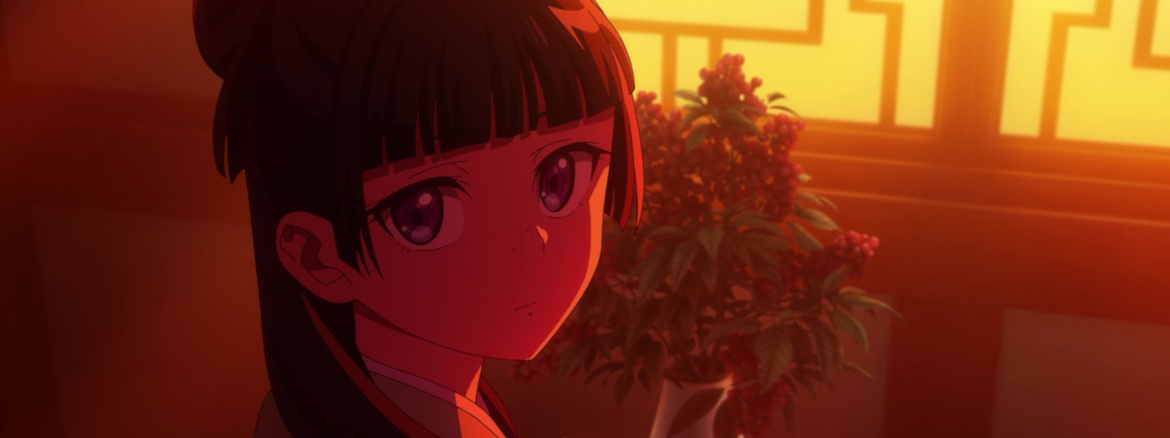



Add comment